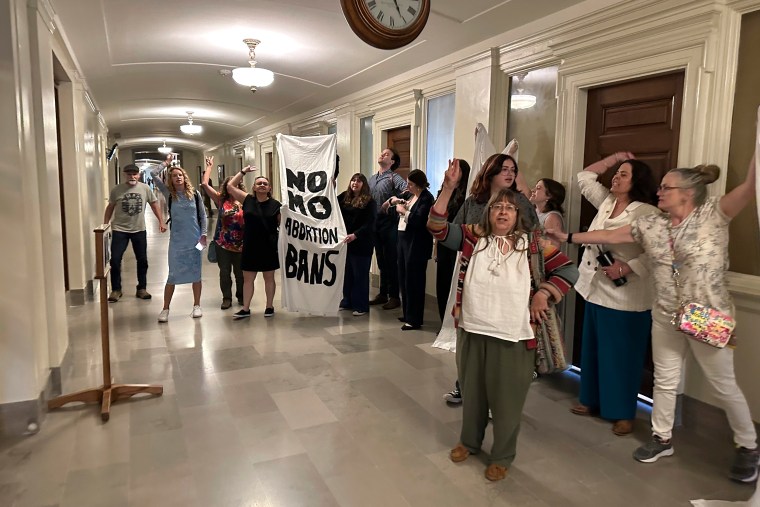WASHINGTON — House Republicans are locked in a tense standoff over how to tackle the federal deduction for state and local taxes, or SALT, a sticky issue that could make or break the party’s big bill for President Donald Trump’s agenda.
The ongoing fight has not only pitted Rep. Jason Smith, R-Mo., the chair of the tax-writing House Ways and Means Committee, against a determined bloc of House Republicans from high-tax blue states; it has also created divisions between the pro-SALT Republicans, undercutting their negotiating leverage and complicating the path to a deal.
While some of them are willing to accept an offer from Smith to raise the cap to $30,000, another faction flatly rejects that figure as insufficient. And they’ve grown increasingly frustrated with some of their colleagues for, in their view, settling for a low-ball offer.
Those tensions came to a boiling point Tuesday when pro-SALT Republicans met in Speaker Mike Johnson’s office to discuss strategy, and asked Rep. Nicole Malliotakis, R-N.Y. — a member of the Ways and Means panel who’s supportive of the $30,000 cap — to leave, according to two sources in the room.
“She wasn’t invited and is not part of our negotiation. That’s why she was asked to leave,” said one of the sources in the room, who described the moment on condition of anonymity. “Jason Smith said yesterday it wasn’t his job to negotiate with us, so no one understands why he sent her there.”
It was a jarring moment of distrust within the faction — a suggestion that Malliotakis was there not to advance their cause but to be a mole for Smith as they were staring him down in a high-stakes negotiation. Rep. Claudia Tenney, R-N.Y., another SALT supporter who sits on the Ways and Means committee, remarked on social media that she also wasn’t invited to the meeting.
Hours later, Malliotakis voted in the committee for the bill with the $30,000 cap, saying in a statement that it will “provide much-needed relief for the middle-class and cover 98% of the families in my district.” Tenney also backed the bill.
Top House Republicans have highlighted their support for the $30,000 level to suggest that a quartet of other New York Republicans who want a bigger deduction — Reps. Elise Stefanik, Mike Lawler, Nick LaLota and Andrew Garbarino — are being unreasonable. But taxes vary by district, which explains why each member has a different level they are willing to stomach for the deduction. The 2017 tax law Republicans are now seeking to extend imposed a $10,000 cap for state and local tax deductions.
Those four New York Republicans are so far sticking together and have the power to sink the entire bill in the narrow House majority, where Johnson has just three votes to spare.
Stefanik, a member of Johnson’s leadership team who has had an icy relationship with the speaker as of late, has taken a lead role in the talks. Rep. Young Kim, R-Calif., who represents one of the highest-taxed districts in the country, has also been aligning closely with the group of New York Republicans. Now it’s up to Johnson to cut a deal and appease the holdouts — many of them from swing districts that will decide which party controls the chamber in the 2026 midterm elections — on the House floor.
Asked about the incident at the meeting Tuesday, Malliotakis told NBC News in a statement: “As the only SALT Caucus member on Ways and Means, all I know is they can sit and negotiate with themselves all they want but there will be no changes unless I and the committee agree.”
Malliotakis said that while everyone needs to advocate for their districts, her goal is to reach a resolution and “deliver the one, big, beautiful bill for America.”
Later, the Staten Island Republican said she huddled with Johnson, Smith and other Ways and Means Committee members “for hours” Tuesday night to try to find a path forward on SALT.
“I think there’s room for some better deal, but the window is closing,” Malliotakis told reporters. “The longer this takes and the closer to Memorial Day we get, the low-sodium diets of many of my colleagues on Ways and Means is growing.”
Smith’s office and Johnson’s office did not respond to requests for comment. But the speaker has publicly insisted that they will reach a deal on SALT, although he acknowledged it may take the weekend to get there. Johnson said he is hosting a meeting Thursday morning between pro-SALT Republicans and some members of the far-right House Freedom Caucus, who don’t want to raise the SALT cap any further unless they get steeper cuts to Medicaid in return.
Tensions flare
As a deal has remained elusive, members of the SALT Caucus have been publicly aiming their fire at Smith, who they believe was trying to jam them by plowing ahead with the committee’s markup of its portion of the broader package, although it’s not unusual for hot-button issues to be punted to leadership.
Still, some pro-SALT Republicans wanted Smith to delay this week’s markup to give them more time to work out a solution, and the speaker asked if Smith could accommodate that request, according to two Republican members and another GOP source familiar with the matter. But the markup proceeded as planned.
There was also another tense moment prior to the markup, when Smith briefed pro-SALT Republicans on his plan to move ahead with the $30,000 cap. During a Monday video meeting, Smith told his colleagues it wasn’t his job to negotiate with the SALT Caucus Republicans, but the speaker’s job, as NBC News previously reported. Smith explained that his bill reflects the will of his committee, not of the SALT Caucus, the sources said.
“Someone should go ask the speaker how he would classify this as a negotiation when his own chair says: ‘I don’t have to negotiate with anybody, I just have to negotiate with my committee,’” Lawler told reporters. “His chair should be reminded that he wouldn’t have a f—ing gavel without the members of the SALT Caucus.”
The group is declining to publicly state its demands, other than wanting to raise the cap higher than the current proposal. Behind the scenes, though, multiple GOP sources said the group is pushing for a $40,000 cap for individuals and $80,000 cap for couples. But that would be expensive and steer funds away from tax policies with broader GOP support, both in the House and the Senate.
As negotiations drag on, SALT members have tried to draw more attention to their pet issue by handing out packets of salt outside the speaker’s office and wearing salt shaker pins that say: “Feelin’ Salty.”
“We’re going to continue to talk with the speaker, especially,” LaLota said. “Unfortunately, the Ways and Means Committee has refused to really negotiate with us in good faith. We’re discussing these matters with the speaker.”
It’s an uncomfortable situation for just about all Republicans involved. None of them wants to be seen as standing in the way of Trump’s agenda. But SALT is such a defining issue in their districts — a reason some of their predecessors lost re-election after imposing the $10,000 cap — that they could pay a political price if voters think they accepted a half-baked deal. Stefanik and Lawler are also eyeing runs for governor in New York, making it even more politically imperative to act.
LaLota said he isn’t concerned about the pushback outside Long Island. “I’m here to make my constituents happy,” he said just off the House floor. “That’s my priority.”
In another sign that GOP leaders are peeling off key votes, Rep. Jeff Van Drew, R-N.J., who also represents a high-tax area, said he supports the $30,000 offer — and encouraged colleagues to be willing to compromise.
“They’re fighting for their constituents. I understand they have some very high taxes. So do we in New Jersey. I’m trying to be mindful of actually getting this big, beautiful bill done, and one of the ways is we’re all going to have to give in a little bit,” he said.
“So we have folks from red states that don’t want to do a penny, don’t even want to do the $10,000 that was there. We’ve got folks from other states that want $100,000 or $200,000. Neither extreme, in my mind, is where we’re going to go,” he added. “It’s going to be somewhere in between.
The SALT fight has also created tensions between more moderate Republicans and the far right of the conference.
Rep. Marjorie Taylor Greene, R-Ga., complained about the SALT push from her colleagues and singled out Lawler on social media, saying he “usually isn’t the guy in the conference with the best ideas.”
Lawler hit back at Greene on X, saying “shockingly, the ‘Jewish Space Laser’ lady once again doesn’t have a clue what she is talking about.”
He later told reporters he is not going to change his mind just “because Marjorie Taylor Greene throws a hissy fit.”





















